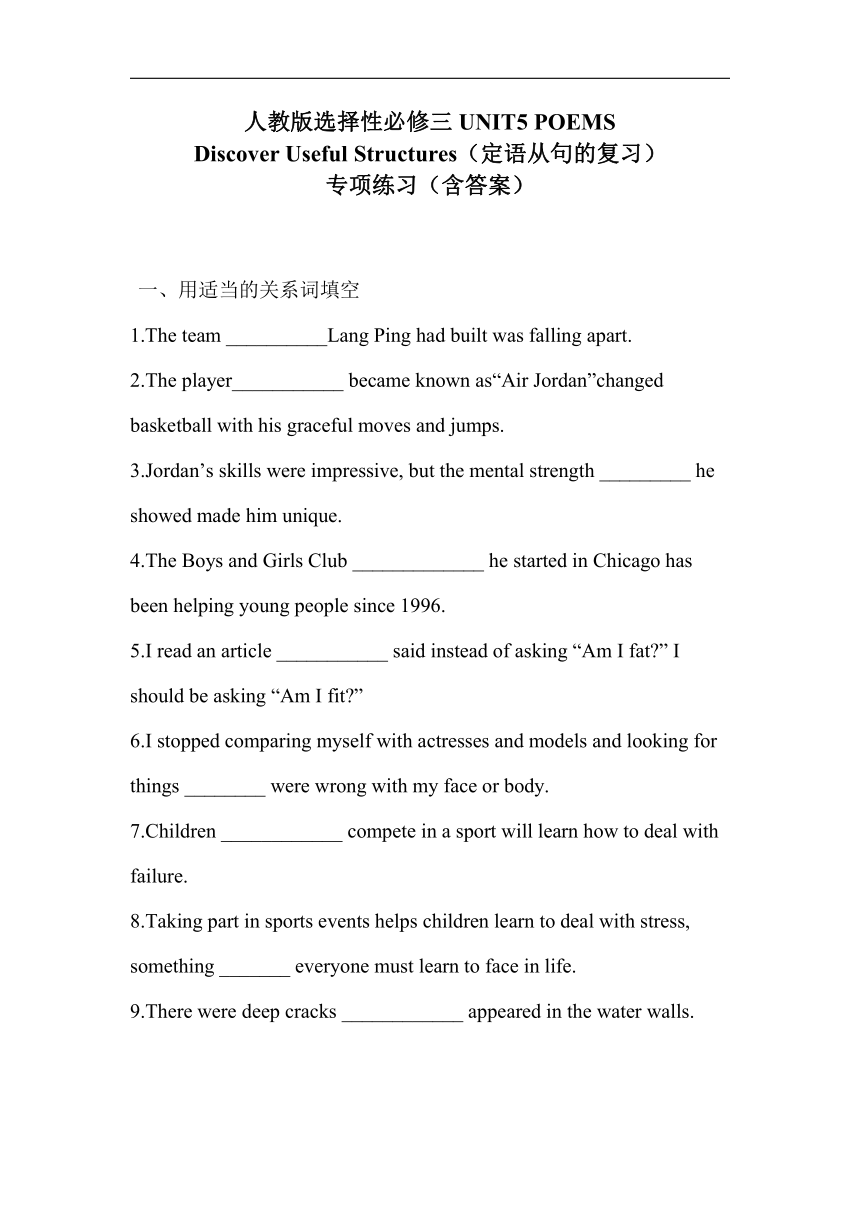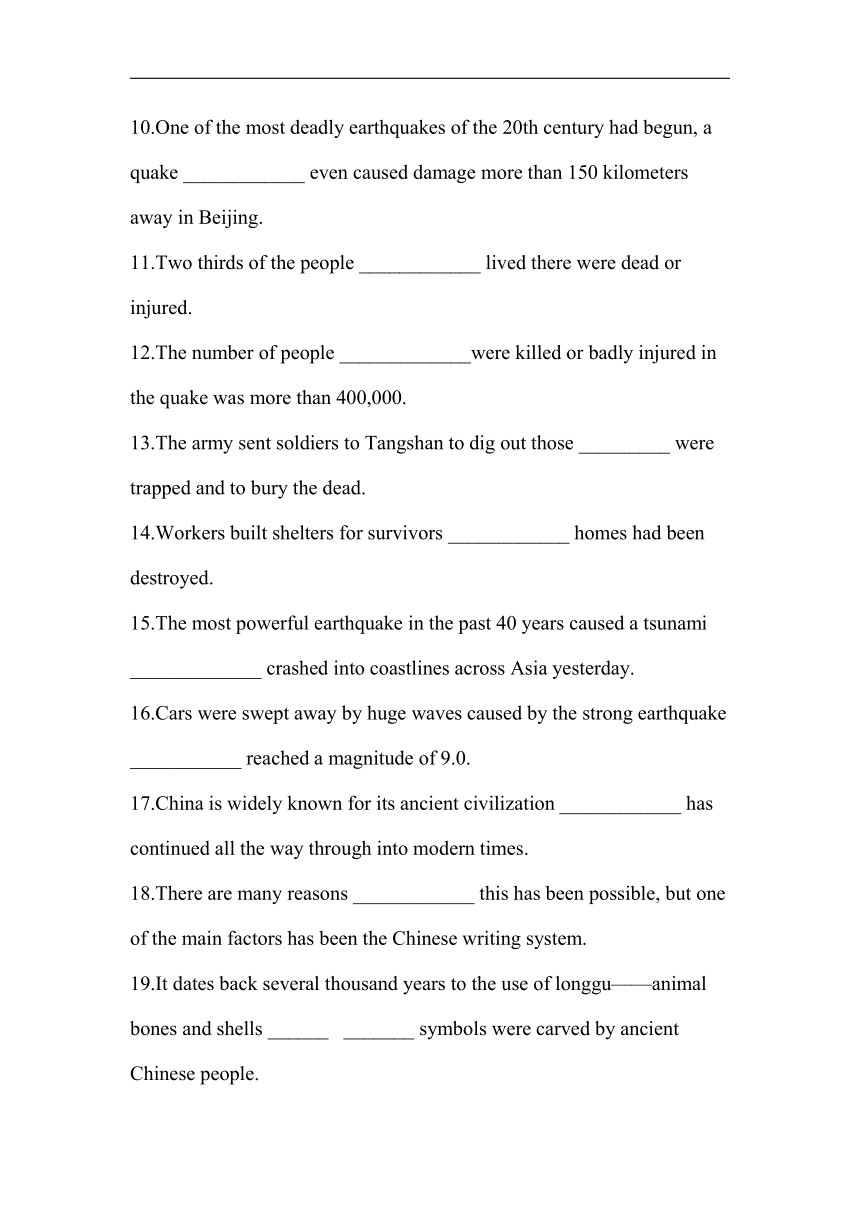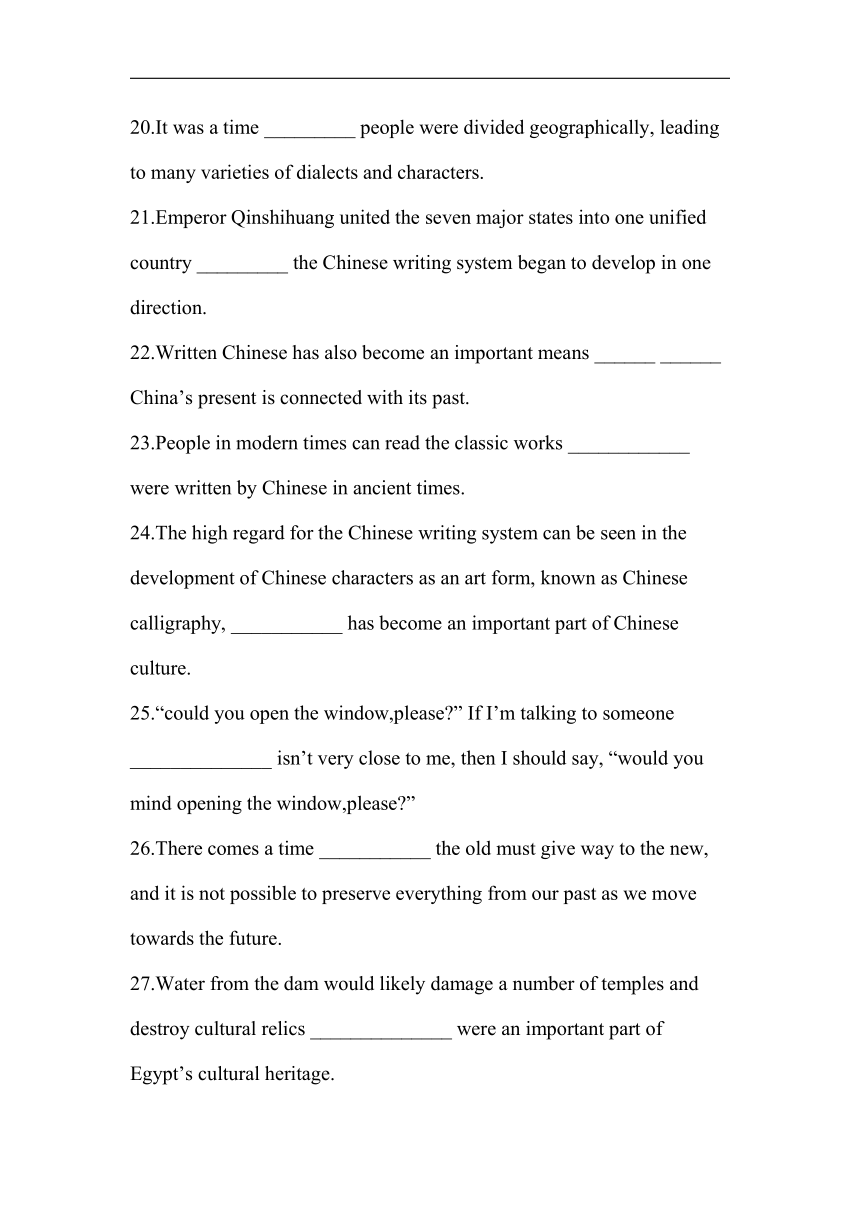人教版(2019)选择性必修第三册Unit 5 Poems Discover useful structures 语法定语从句用法复习练习(含答案)
文档属性
| 名称 | 人教版(2019)选择性必修第三册Unit 5 Poems Discover useful structures 语法定语从句用法复习练习(含答案) |  | |
| 格式 | docx | ||
| 文件大小 | 20.4KB | ||
| 资源类型 | 教案 | ||
| 版本资源 | 人教版(2019) | ||
| 科目 | 英语 | ||
| 更新时间 | 2024-04-17 12:45:54 | ||
图片预览



文档简介
人教版选择性必修三UNIT5 POEMS
Discover Useful Structures(定语从句的复习)
专项练习(含答案)
用适当的关系词填空
1.The team __________Lang Ping had built was falling apart.
2.The player___________ became known as“Air Jordan”changed basketball with his graceful moves and jumps.
3.Jordan’s skills were impressive, but the mental strength _________ he showed made him unique.
4.The Boys and Girls Club _____________ he started in Chicago has been helping young people since 1996.
5.I read an article ___________ said instead of asking “Am I fat ” I should be asking “Am I fit ”
6.I stopped comparing myself with actresses and models and looking for things ________ were wrong with my face or body.
7.Children ____________ compete in a sport will learn how to deal with failure.
8.Taking part in sports events helps children learn to deal with stress, something _______ everyone must learn to face in life.
9.There were deep cracks ____________ appeared in the water walls.
10.One of the most deadly earthquakes of the 20th century had begun, a quake ____________ even caused damage more than 150 kilometers away in Beijing.
11.Two thirds of the people ____________ lived there were dead or injured.
12.The number of people _____________were killed or badly injured in the quake was more than 400,000.
13.The army sent soldiers to Tangshan to dig out those _________ were trapped and to bury the dead.
14.Workers built shelters for survivors ____________ homes had been destroyed.
15.The most powerful earthquake in the past 40 years caused a tsunami _____________ crashed into coastlines across Asia yesterday.
16.Cars were swept away by huge waves caused by the strong earthquake ___________ reached a magnitude of 9.0.
17.China is widely known for its ancient civilization ____________ has continued all the way through into modern times.
18.There are many reasons ____________ this has been possible, but one of the main factors has been the Chinese writing system.
19.It dates back several thousand years to the use of longgu——animal bones and shells ______ _______ symbols were carved by ancient Chinese people.
20.It was a time _________ people were divided geographically, leading to many varieties of dialects and characters.
21.Emperor Qinshihuang united the seven major states into one unified country _________ the Chinese writing system began to develop in one direction.
22.Written Chinese has also become an important means ______ ______ China’s present is connected with its past.
23.People in modern times can read the classic works ____________ were written by Chinese in ancient times.
24.The high regard for the Chinese writing system can be seen in the development of Chinese characters as an art form, known as Chinese calligraphy, ___________ has become an important part of Chinese culture.
25.“could you open the window,please ” If I’m talking to someone ______________ isn’t very close to me, then I should say, “would you mind opening the window,please ”
26.There comes a time ___________ the old must give way to the new, and it is not possible to preserve everything from our past as we move towards the future.
27.Water from the dam would likely damage a number of temples and destroy cultural relics ______________ were an important part of Egypt’s cultural heritage.
28.After listening to the scientists ______________ had studied the problem, and citizens _______________ lived near the dam,the government turned to the United Nations for help in 1959.
29.Temples and other cultural sites were take down piece by piece, and then moved and put back together again in a place ___________ they were safe from the water.
30.Not only had the countries found a path to the future _____________did not run over the relics of the past, but they also learnt that is was possible for countries to work together to build a better tomorrow.
31.Perhaps the best example is shown by UNESCO, __________ runs a programme that prevents world cultural heritage sites around the world from disappearing.
32.Whenever I met her , __________ was fairly often , she greeted me with a sweet smile .
33.The famous footballer , in __________ honour a party will be held , is to arrive this afternoon.
34. Happiness and success often come to those __________ are good at recognising their own strengths .
35. Suppose you ' re in a rush , feeling tired , not paying attention to your screen , and you send an email __________ could get you in trouble .
36. Nowadays people are more concerned about the environment__________ they live .
37. The book tells stories of the earthquake through the eyes of those__________ lives were affected .
二、用适当的连词或关系词完成短文
Nat ,1.__________ was ten years old , lived in a small town in England . He always stayed in England for his holidays ,2. __________ one day he decided to go to Spain ,3.__________ all his friends liked to go for their holidays . First he went to Madrid ,4. __________ is the capital of Spain , and stayed in a small hotel . On the first morning , he went out for a walk . In England , people drive on the left . But in Spain , they drive on the right ,5__________ .he forgot .6.__________ he was walking along a busy street , a bike 7. __________ came before him knocked him down . Nat was sent to the hospital , in 8. __________ the girl 9. __________ rode the bike said sorry to him . After two days , Nat left Spain and returned to England . He told his friends that he wouldn ' t forget the days 10. __________ he stayed in Spain .
参考答案:
that / which / 不填.
who / that
that/ which / 不填.
Which / that /不填.
.that/ which
that/ which
that
wholthat
that / which
that/ which
who / that
wholthat
Who
whose
thatlwhich
, thatlwhich
.that/ which
why / for hich
On which
.When/
Where
by which
that Jwhich
which
who/ that
When
thatlwhzch
holthat
Where
that/ which
which
which
whose
who / that
that / which
where
whose
二、
who 2. but 3. where 4. which
which 6. While 7. which / that 8. which
9. who / that 10. when
Discover Useful Structures(定语从句的复习)
专项练习(含答案)
用适当的关系词填空
1.The team __________Lang Ping had built was falling apart.
2.The player___________ became known as“Air Jordan”changed basketball with his graceful moves and jumps.
3.Jordan’s skills were impressive, but the mental strength _________ he showed made him unique.
4.The Boys and Girls Club _____________ he started in Chicago has been helping young people since 1996.
5.I read an article ___________ said instead of asking “Am I fat ” I should be asking “Am I fit ”
6.I stopped comparing myself with actresses and models and looking for things ________ were wrong with my face or body.
7.Children ____________ compete in a sport will learn how to deal with failure.
8.Taking part in sports events helps children learn to deal with stress, something _______ everyone must learn to face in life.
9.There were deep cracks ____________ appeared in the water walls.
10.One of the most deadly earthquakes of the 20th century had begun, a quake ____________ even caused damage more than 150 kilometers away in Beijing.
11.Two thirds of the people ____________ lived there were dead or injured.
12.The number of people _____________were killed or badly injured in the quake was more than 400,000.
13.The army sent soldiers to Tangshan to dig out those _________ were trapped and to bury the dead.
14.Workers built shelters for survivors ____________ homes had been destroyed.
15.The most powerful earthquake in the past 40 years caused a tsunami _____________ crashed into coastlines across Asia yesterday.
16.Cars were swept away by huge waves caused by the strong earthquake ___________ reached a magnitude of 9.0.
17.China is widely known for its ancient civilization ____________ has continued all the way through into modern times.
18.There are many reasons ____________ this has been possible, but one of the main factors has been the Chinese writing system.
19.It dates back several thousand years to the use of longgu——animal bones and shells ______ _______ symbols were carved by ancient Chinese people.
20.It was a time _________ people were divided geographically, leading to many varieties of dialects and characters.
21.Emperor Qinshihuang united the seven major states into one unified country _________ the Chinese writing system began to develop in one direction.
22.Written Chinese has also become an important means ______ ______ China’s present is connected with its past.
23.People in modern times can read the classic works ____________ were written by Chinese in ancient times.
24.The high regard for the Chinese writing system can be seen in the development of Chinese characters as an art form, known as Chinese calligraphy, ___________ has become an important part of Chinese culture.
25.“could you open the window,please ” If I’m talking to someone ______________ isn’t very close to me, then I should say, “would you mind opening the window,please ”
26.There comes a time ___________ the old must give way to the new, and it is not possible to preserve everything from our past as we move towards the future.
27.Water from the dam would likely damage a number of temples and destroy cultural relics ______________ were an important part of Egypt’s cultural heritage.
28.After listening to the scientists ______________ had studied the problem, and citizens _______________ lived near the dam,the government turned to the United Nations for help in 1959.
29.Temples and other cultural sites were take down piece by piece, and then moved and put back together again in a place ___________ they were safe from the water.
30.Not only had the countries found a path to the future _____________did not run over the relics of the past, but they also learnt that is was possible for countries to work together to build a better tomorrow.
31.Perhaps the best example is shown by UNESCO, __________ runs a programme that prevents world cultural heritage sites around the world from disappearing.
32.Whenever I met her , __________ was fairly often , she greeted me with a sweet smile .
33.The famous footballer , in __________ honour a party will be held , is to arrive this afternoon.
34. Happiness and success often come to those __________ are good at recognising their own strengths .
35. Suppose you ' re in a rush , feeling tired , not paying attention to your screen , and you send an email __________ could get you in trouble .
36. Nowadays people are more concerned about the environment__________ they live .
37. The book tells stories of the earthquake through the eyes of those__________ lives were affected .
二、用适当的连词或关系词完成短文
Nat ,1.__________ was ten years old , lived in a small town in England . He always stayed in England for his holidays ,2. __________ one day he decided to go to Spain ,3.__________ all his friends liked to go for their holidays . First he went to Madrid ,4. __________ is the capital of Spain , and stayed in a small hotel . On the first morning , he went out for a walk . In England , people drive on the left . But in Spain , they drive on the right ,5__________ .he forgot .6.__________ he was walking along a busy street , a bike 7. __________ came before him knocked him down . Nat was sent to the hospital , in 8. __________ the girl 9. __________ rode the bike said sorry to him . After two days , Nat left Spain and returned to England . He told his friends that he wouldn ' t forget the days 10. __________ he stayed in Spain .
参考答案:
that / which / 不填.
who / that
that/ which / 不填.
Which / that /不填.
.that/ which
that/ which
that
wholthat
that / which
that/ which
who / that
wholthat
Who
whose
thatlwhich
, thatlwhich
.that/ which
why / for hich
On which
.When/
Where
by which
that Jwhich
which
who/ that
When
thatlwhzch
holthat
Where
that/ which
which
which
whose
who / that
that / which
where
whose
二、
who 2. but 3. where 4. which
which 6. While 7. which / that 8. which
9. who / that 10. when
